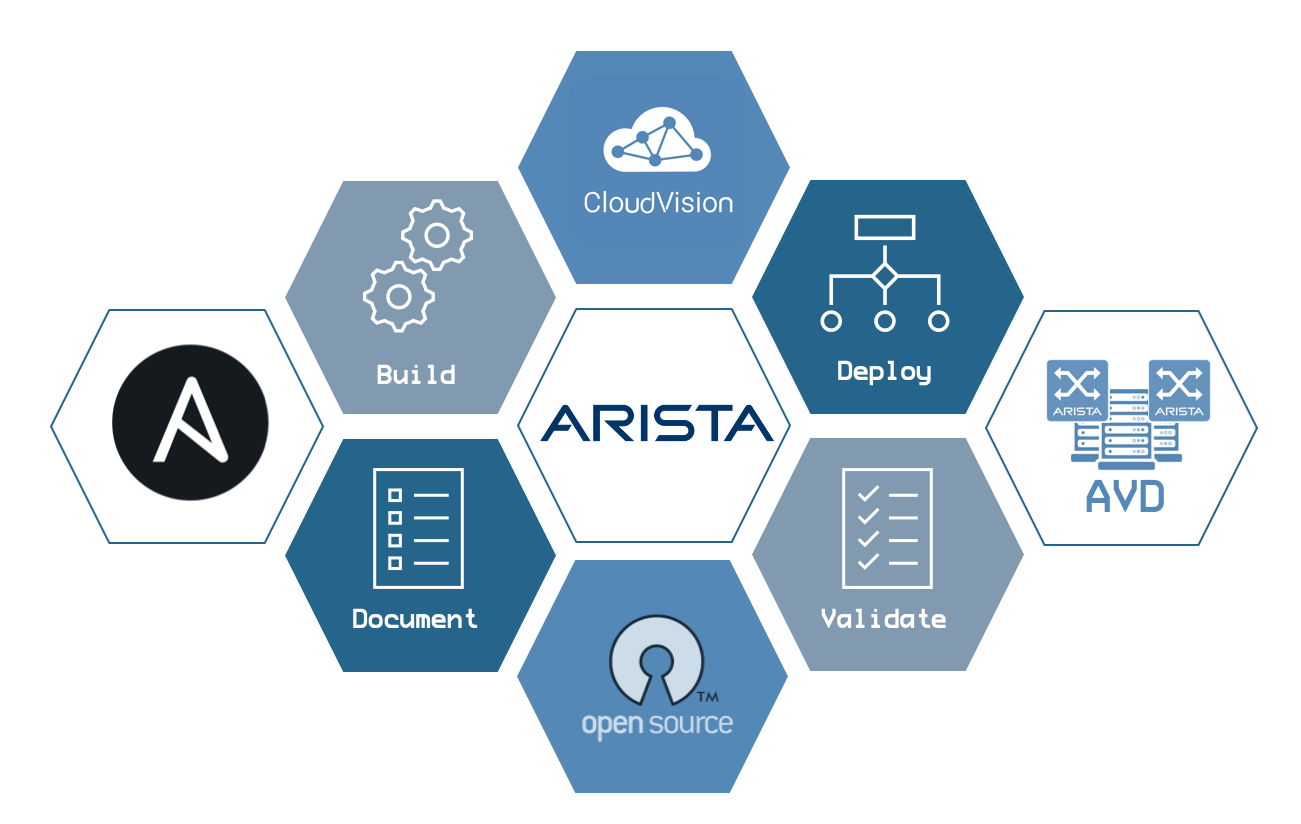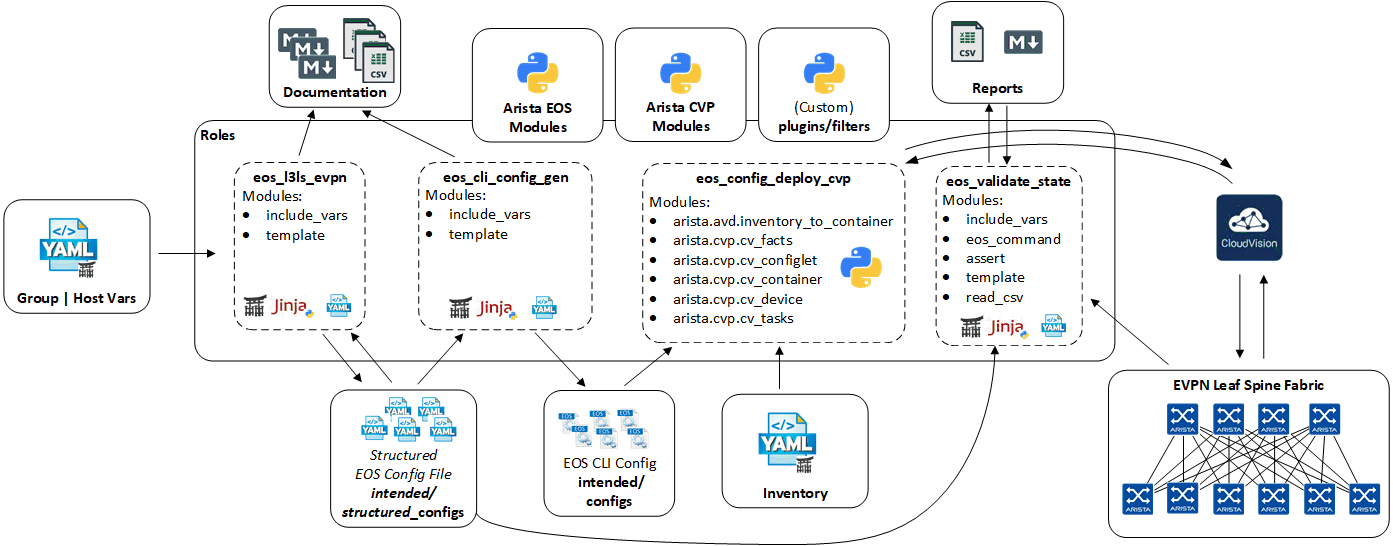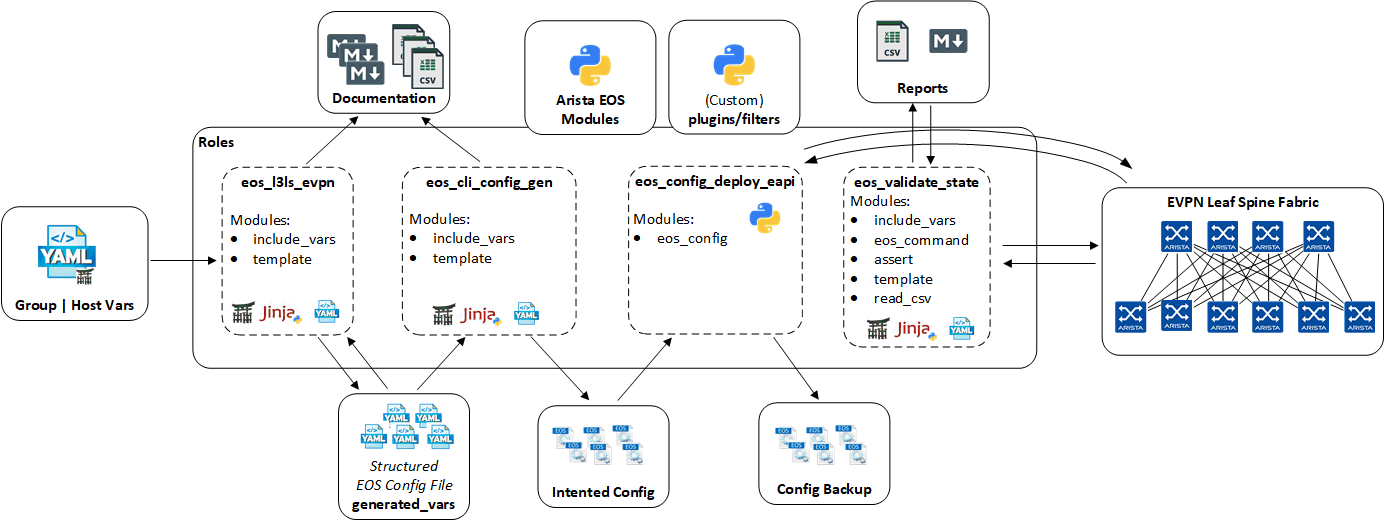Table of Contents:
Arista Networks supports Ansible for managing devices running the EOS operating system natively through eapi or CloudVision Portal (CVP). This collection includes a set of ansible roles and modules to help kick-start your automation with Arista. The various roles and templates provided are designed to be customized and extended to your needs!
The documentation how to leverage ansible-avd collection is located here: arista.avd
Arista EOS:
- EOS 4.21.8M or later
- Roles validated with eAPI transport ->
ansible_connection: httpapi
Python:
- Python 3.6.8 or later
Supported Ansible Versions:
- ansible 2.9.2 or later
Additional Python Libraries required:
- Jinja2
2.10.3 - netaddr
0.7.19 - requests
2.22.0 - treelib
1.5.5 - pytest
5.3.4 - pytest-html
2.0.1 - cvprac
1.0.4
Ansible + Additional Python Libraries Installation:
pip3 install -r development/requirements.txtrequirements.txt content:
ansible==2.9.2
Jinja2==2.10.3
netaddr==0.7.19
requests==2.22.0
treelib==1.5.5
pytest==5.3.4
pytest-html==2.0.1
cvprac==1.0.4
Ansible Configuration INI file:
- enable jinja2 extensions: loop controls and do
- By default, Ansible will issue a warning when a duplicate dict key is encountered in YAML. We recommend to change to error instead and stop playbook execution when a duplicate key is detected.
jinja2_extensions=jinja2.ext.loopcontrols,jinja2.ext.do
duplicate_dict_key=errorNOTE: When using ansible-cvp modules, the user that is executing the ansible-playbook has to have access to both CVP and the EOS CLI.
Ansible galaxy hosts all stable version of this collection. Installation from ansible-galaxy is the most convenient approach for consuming arista.avd content
ansible-galaxy collection install arista.avdAn example playbook to deploy VXLAN/EVPN Fabric via CloudVision:
- hosts: DC1_FABRIC
tasks:
- name: generate intended variables
import_role:
name: arista.avd.eos_l3ls_evpn
- name: generate device intended config and documentation
import_role:
name: arista.avd.eos_cli_config_gen
- hosts: CVP
tasks:
- name: deploy configuration via CVP
import_role:
name: arista.avd.eos_config_deploy_cvpExecute eos_state_validation playbook once change control has been approved and deployed to devices in CVP. Note: To run this playbook, ansible_host must be configured in your inventory for every EOS device. eAPI access must be configured and allowed in your networks.
- hosts: DC1_FABRIC
tasks:
- name: audit fabric state using EOS eAPI connection
import_role:
name: arista.avd.eos_validate_stateAn example playbook to deploy VXLAN/EVPN Fabric via eAPI:
- hosts: DC1_FABRIC
tasks:
- name: generate intended variables
import_role:
name: arista.avd.eos_l3ls_evpn
- name: generate device intended config and documentation
import_role:
name: arista.avd.eos_cli_config_gen
- name: deploy configuration via eAPI
import_role:
name: arista.avd.eos_config_deploy_eapi
- name: audit fabric state using EOS eAPI connection
import_role:
name: arista.avd.eos_validate_stateFull examples with variables and outputs, are located here:
- Ansible EOS modules on ansible documentation.
- Ansible CloudVision modules
- CloudVision Portal
- Arista Design and Deployment Guides
Support for this arista.avd collection is provided by the community directly in this repository. Easiest way to get support is to open an issue.
Contributing pull requests are gladly welcomed for this repository. If you are planning a big change, please start a discussion first to make sure we'll be able to merge it.
You can also open an issue to report any problem or to submit enhancement.
- The
develbranch corresponds to the release actively under development. - The
releases/x.x.xbranches correspond to stable releases. - Fork repository and create a branch based on
develto set up a dev environment if you want to open a PR. - See the ansible-avd release for information about active branches.
Project is published under Apache 2.0 License





